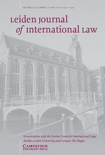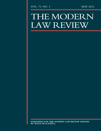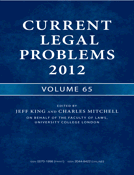
AJIL Unbound
Scope & Guideline
Empowering Voices in International Law and Social Science
Introduction
Aims and Scopes
- Interdisciplinary Perspectives on International Law:
The journal encourages contributions that bridge international law with other disciplines such as political science, sociology, and economics, fostering a holistic understanding of legal issues in a global context. - Contemporary Legal Challenges and Innovations:
AJIL Unbound addresses pressing global challenges, including climate change, human rights, and digital governance, exploring innovative legal responses and frameworks. - Focus on Global Governance and Institutions:
The journal examines the role of international organizations and institutions in shaping legal norms and practices, critically assessing their effectiveness and impact on global governance. - Critical Examination of Historical and Cultural Contexts:
AJIL Unbound invites analysis that contextualizes legal developments within historical and cultural frameworks, particularly concerning race, gender, and indigenous rights. - Symposia on Current Legal Debates:
The journal frequently organizes symposia that gather diverse viewpoints on specific topics, facilitating in-depth discussions and advancing scholarly dialogue.
Trending and Emerging
- Digital Evidence and Cybersecurity Law:
With the increasing significance of technology in international relations, there is a rising focus on the legal implications of digital evidence, cybersecurity, and the regulation of digital trade. - Climate Change and Environmental Justice:
The journal has intensified its engagement with climate change issues, particularly the legal frameworks surrounding environmental justice and the recognition of the right to a healthy environment. - Intersectionality in International Law:
Emerging themes explore the intersectionality of race, gender, and identity within international law, reflecting a commitment to inclusivity and the recognition of diverse legal experiences. - Indigenous Rights and Decolonization:
There is a growing emphasis on indigenous rights and decolonization, as the journal seeks to amplify voices that challenge traditional legal narratives and advocate for justice and recognition. - Global Health Law Post-Pandemic:
In the wake of the COVID-19 pandemic, the journal is increasingly focusing on global health law, exploring the legal frameworks needed to address health crises and ensure equitable access to healthcare.
Declining or Waning
- Traditional Views on State Sovereignty:
Discussions centered around classical notions of state sovereignty appear to be declining, as newer perspectives emphasize global interdependence and the need for collaborative governance. - Static Legal Frameworks:
There is a noticeable reduction in papers advocating for rigid, traditional legal frameworks, with a growing preference for dynamic and adaptable legal approaches that respond to changing global realities. - Focus on Regional Issues in Isolation:
The journal has gradually shifted away from region-specific analyses that do not engage with broader global contexts, favoring discussions that consider interconnectedness and transnational implications. - Outdated Legal Theories:
Some older legal theories and methodologies that do not align with contemporary debates on justice, equity, and inclusivity are being phased out, as the journal embraces more progressive and critical legal scholarship.
Similar Journals

Lexonomica
Illuminating the Intersection of Law and PolicyLexonomica is an influential academic journal published by UNIV MARIBOR, FAC LAW, dedicated to the field of legal studies and its intersections with socio-economic issues. With a commitment to fostering scholarly communication, Lexonomica offers a platform for researchers, practitioners, and students to disseminate their findings and insights on contemporary legal matters, policy analysis, and theoretical developments. Although currently not an open access journal, it plays a pivotal role in contributing to the academic dialogue within the legal community, as evidenced by its unique ISSN (1855-7147) and E-ISSN (1855-7155). The journal aspires to promote high-quality research and facilitate the understanding of legal phenomena in a globalized context, underlining its importance for those seeking to engage critically with the law in an ever-evolving landscape. The journal's address is located in beautiful Maribor, Slovenia, symbolizing a rich tradition of legal education and research.

Grotiana
Exploring the Intersection of History and LawGrotiana, a prestigious journal published by BRILL, stands as a vital resource for scholars and professionals engaged in the fields of History and Law. With its ISSN 0167-3831 and E-ISSN 1876-0759, this journal has been a beacon of academic inquiry since its inception, covering a diverse array of topics with an emphasis on legal history and historical jurisprudence. Grotiana holds a commendable impact within the academic community, reflected in its 2023 Scopus ranks indicating a 91st percentile in History and a 67th percentile in Law, underscoring its significance in interdisciplinary studies. Although not an open-access journal, it offers robust access options for institutions and individuals alike, facilitating research and knowledge dissemination. Scholars can benefit from its rich historical insights and rigorous legal analysis, contributing to the ongoing dialogue in these fields. With publishing cycles spanning from 1980 to 2024, Grotiana continues to uphold its commitment to excellence, making it a pivotal player for researchers, students, and professionals pursuing a deeper understanding of historical and legal frameworks.

Vestnik of Saint Petersburg University-Law-Vestnik Sankt-Peterburgskogo Universiteta-Pravo
Enriching Understanding of Russian Legal PrinciplesVestnik of Saint Petersburg University-Law, published by St Petersburg University Press, is a vital academic resource in the field of law, particularly significant within the Russian legal landscape. With an ISSN of 2074-1243 and an E-ISSN of 2587-5833, this journal serves as a platform for rigorous research, critical analysis, and scholarly discourse, contributing to the advancement of legal knowledge and practice. Although currently classified in the Q4 quartile for the year 2023 by Scopus rankings, it holds a unique position within the academic community, catering to a diverse audience of researchers, legal professionals, and students, especially those interested in the evolving nuances of law in Russia. You can explore comprehensive studies and articles that reflect the contemporary challenges and developments in law, while benefiting from the journal's focus on fostering a deep understanding of legal principles. The journal runs from 2019 to 2024, encapsulating emerging trends and insights in law that are critical for continuous learning and growth in this discipline.

German Law Journal
Exploring the Depths of German Legal ScholarshipGerman Law Journal, published by Cambridge University Press, stands as a leading open-access platform for scholarly discourse in the field of law, having made its content freely available since 2019. With an impressive impact factor that places it in the Q1 category for Law as of 2023, and a robust Scopus ranking of #164 out of 1025 in the social sciences category, this journal is recognized for its high-quality research and significant contributions to legal scholarship. The journal encompasses a wide array of topics pertinent to the German legal system, European Union law, and comparative legal studies, thus catering to researchers, legal practitioners, and students alike. Located in the heart of the UK, at Edinburgh Building, Shaftesbury Rd, Cambridge, this journal not only fosters academic engagement but also promotes interdisciplinary dialogues that enrich the understanding of legal principles in an evolving global context. Emphasizing accessibility and high academic standards, the German Law Journal serves as an essential resource for those seeking to explore and contribute to contemporary legal discussions.

Revista Juridica Portucalense
Advancing Legal Discourse in a Dynamic WorldRevista Juridica Portucalense, published by the Universidade Portucalense Infante D Henrique Cooperativa de Ensino Superior in Portugal, stands as an influential peer-reviewed journal focusing on the fields of Law, Political Science, and Sociology. With an ISSN of 2183-5799 and an E-ISSN of 2183-5705, this Open Access journal has made significant strides in promoting scholarly research and academic discourse since its launch in 2014. The journal is categorized in the Q3 quartile for 2023 across its respective disciplines, highlighting its growing impact within the academic community, despite its current H-index rating still being unestablished. With a Scopus ranking pointing to its dedication to quality scholarship—ranked #724/1025 in Law and maintaining a presence in Political Science and Sociology—Revista Juridica Portucalense is an indispensable resource for researchers, practitioners, and students alike who are eager to engage with contemporary legal issues and the interplay of political and social dynamics.

Leiden Journal of International Law
Connecting theory with practice in international relations.Leiden Journal of International Law, published by Cambridge University Press, stands as a leading platform for scholarly discourse in the fields of international law and political science. With its ISSN 0922-1565 and E-ISSN 1478-9698, the journal has established a significant academic presence since its inception in 1988, upholding rigorous standards through a robust peer-review process. The journal is notable for its impressive impact factor, categorizing it in the Q1 quartile for law and Q2 for political science and international relations, indicating its widespread influence and recognition among scholars. As a vital resource for researchers and practitioners, the journal contributes to the advancement of legal scholarship and promotes critical discussions surrounding contemporary international issues. Although it operates under a traditional subscription model, its comprehensive analyses and critical insights make it an essential read for those engaged in the interdisciplinary examination of law and global governance. The journal is headquartered in Cambridge, England, and continues to play a pivotal role in shaping the discussions that define the contemporary landscape of international law.

MODERN LAW REVIEW
Advancing Contemporary Legal Scholarship.MODERN LAW REVIEW, a prestigious academic journal published by Wiley, stands as a significant platform in the field of law, dedicated to exploring contemporary legal issues and fostering scholarly discourse since its inception in 1937. With an impressive Scopus Rank of #237 out of 1025 in the Social Sciences - Law category, placing it in the 76th percentile, the journal has consistently maintained a reputation for high-quality research, currently positioned in Q2 of the category quartiles as of 2023. The journal's comprehensive coverage spans various legal topics, making it essential reading for legal scholars, practitioners, and students alike. Although it is not an open-access journal, its contributions are invaluable for guiding the future of legal scholarship. With a robust history of converged years from 1995, 1997 to 1999, 2001 to 2002, 2004, and 2011 to 2024, MODERN LAW REVIEW remains at the forefront of legal research, addressing pressing issues and influencing legal thought across disciplines.

Utrecht Journal of International and European Law
Advancing Innovative Legal ScholarshipUtrecht Journal of International and European Law, published by UBIQUITY PRESS LTD, serves as a dynamic platform for the dissemination of scholarly research in the realms of international and European law. Since its inception as an open-access journal in 2013, it has provided unrestricted access to cutting-edge legal scholarship, fostering global dialogue among legal professionals, researchers, and students. With a notable Scopus rank of 249 out of 1,025 in the law category and a commendable Q3 rating, the journal emphasizes innovative legal theories and practices relevant to contemporary global challenges. Located in the heart of the United Kingdom, the Utrecht Journal is committed to maintaining high academic standards while also promoting the exchange of knowledge across borders, which is crucial given the ever-evolving landscape of international law. As it converges its focus from 2020 to 2024, the journal seeks to become an essential reference for those dedicated to the exploration and expansion of legal discourse in this vital field.

Current Legal Problems
Advancing legal discourse for a dynamic world.Current Legal Problems is a premier academic journal published by Oxford University Press, dedicated to advancing the field of law through critical analysis and interdisciplinary research. With an ISSN of 0070-1998 and an E-ISSN of 2044-8422, this journal has established itself as a vital resource for legal scholars and practitioners alike since its inception in 1983. Recognized with a Q1 category ranking in Law for 2023, it ranks notably in Scopus as #415 out of 1025, placing it in the 59th percentile, further underlining its influence and importance. The journal's scope encompasses contemporary legal issues, providing a platform for innovative legal thought and discussion. Although it does not follow an open access model, the journal remains accessible through both print and digital subscriptions, catering to a global audience from its base in Oxford, United Kingdom. Researchers, students, and legal professionals will find Current Legal Problems indispensable for staying informed about the latest legal developments and scholarly debates.

International Organizations Law Review
Fostering Insightful Dialogue on International Organizational DynamicsInternational Organizations Law Review is a distinguished academic journal published by BRILL, focusing on the interdisciplinary intersections of law, political science, and economics in the context of international organizations. With an ISSN of 1572-3739 and an E-ISSN of 1572-3747, this journal has been a key player in advancing scholarly dialogue since its inception in 2004, and it is set to continue its vital contribution until 2024. Though currently categorized in the Q4 quartile across various domains, including Economics and Law, it holds a respectable position within Scopus rankings, indicating its growing influence in the social sciences. Researchers and professionals looking for critical insights and the latest research in international law and organizational dynamics will find this journal invaluable. The International Organizations Law Review is committed to fostering a deeper understanding of the legal frameworks governing international interactions, making it an essential resource for students and academics alike.